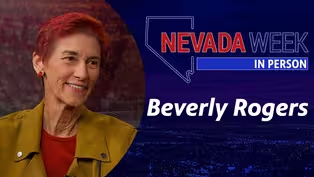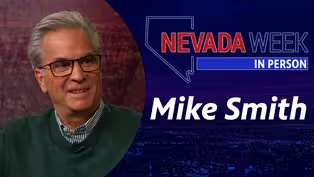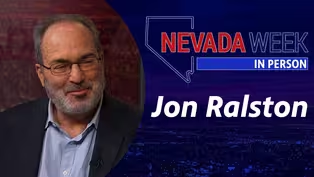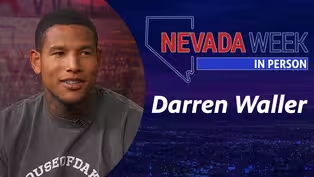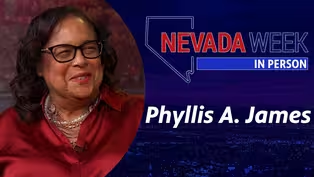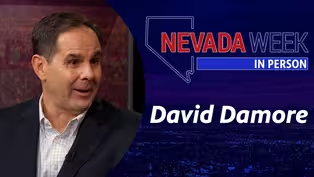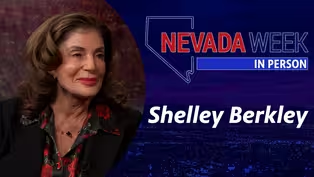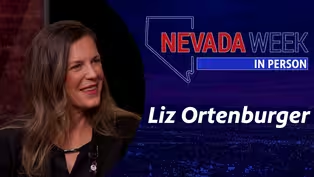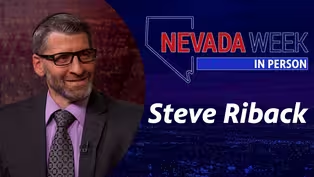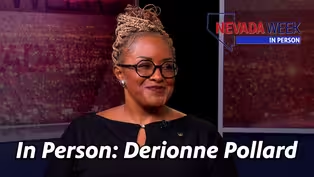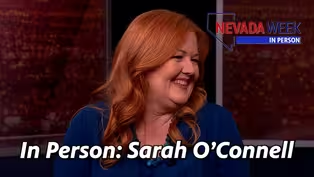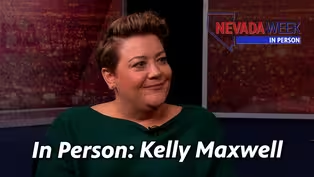
Nevada Week In Person | Gerome Sapp
Season 1 Episode 21 | 14mVideo has Closed Captions
One-on-one with former NFL player Gerome Sapp.
One-on-one with former NFL player and founder of Rares Gerome Sapp.
Problems playing video? | Closed Captioning Feedback
Problems playing video? | Closed Captioning Feedback
Nevada Week In Person is a local public television program presented by Vegas PBS

Nevada Week In Person | Gerome Sapp
Season 1 Episode 21 | 14mVideo has Closed Captions
One-on-one with former NFL player and founder of Rares Gerome Sapp.
Problems playing video? | Closed Captioning Feedback
How to Watch Nevada Week In Person
Nevada Week In Person is available to stream on pbs.org and the free PBS App, available on iPhone, Apple TV, Android TV, Android smartphones, Amazon Fire TV, Amazon Fire Tablet, Roku, Samsung Smart TV, and Vizio.
Providing Support for PBS.org
Learn Moreabout PBS online sponsorshipMore from This Collection
Nevada Week In Person goes beyond the roundtable discussion of Nevada Week with guests for a more casual conversation about their personal passions, new projects and compelling stories that are overlooked in the flurry of the news cycle.
Nevada Week In Person | Beverly Rogers
Video has Closed Captions
One-on-one interview with Rogers Foundation chair Beverly Rogers. (14m)
Nevada Week In Person | Mike Smith
Video has Closed Captions
One-on-one interview with Las Vegas Sun political cartoonist Mike Smith. (14m)
Nevada Week In Person | Jon Ralston
Video has Closed Captions
One-on-one interview with The Nevada Independent CEO Jon Ralston. (14m)
Nevada Week In Person | Darren Waller
Video has Closed Captions
One-on-one interview with Las Vegas Raider tight end Darren Waller. (14m)
Nevada Week In Person | Phyllis A. James
Video has Closed Captions
One-on-one interview Phyllis A. James. (14m)
Nevada Week In Person | David Damore
Video has Closed Captions
One-on-one interview with Chair of the Department of Political Science at UNLV David Damor (14m)
Nevada Week In Person | Shelley Berkley
Video has Closed Captions
One-on-one interview Senior Vice President for Touro University Shelley Berkley. (14m)
Nevada Week In Person | Liz Ortenburger
Video has Closed Captions
One-on-one interview with SafeNest CEO Liz Ortenburger. (14m)
Nevada Week In Person | Steve Riback
Video has Closed Captions
One-on-one interview with Las Vegas Metro Police Lieutenant Steve Riback. (14m)
Nevada Week In Person | DeRionne Pollard
Video has Closed Captions
One-on-one interview Nevada State College President DeRionne Pollard. (14m)
Nevada Week In Person | Sarah O’Connell
Video has Closed Captions
One-on-one interview with Director of Eat More Art LLC Sarah O’Connell. (14m)
Nevada Week In Person | Kelly Maxwell
Video has Closed Captions
One-on-one interview with Baby’s Bounty Executive Director Kelly Maxwell. (14m)
Providing Support for PBS.org
Learn Moreabout PBS online sponsorshipA retired NFL player turned entrepreneur, Gerome Sapp has started several companies but his latest venture, which made auction history, aims to promote financial literacy among minorities.
Gerome Sapp joins us this week on Nevada Week In Person.
♪♪♪ Support for Nevada Week In Person is provided by Senator William H. Hernstadt and additional supporting sponsors.
(Amber Renee Dixon) After a five-year NFL career playing defensive back for the Baltimore Ravens and Indianapolis Colts, Gerome Sapp decided to utilize his finance degree from Notre Dame and the MBA he earned from Harvard Business School.
Right now his focus is on the company he founded called "Rares."
It's an app that allows users to invest in collectible and very expensive sneakers.
Gerome Sapp, thank you for joining us for Nevada Week In Person.
-Thanks for having me.
-A five-year NFL career is an accomplishment that such a small fraction of people will ever accomplish.
What brought your career to an end, and where did you decide to go from there?
(Gerome Sapp) You know, that's a good question.
I was very fortunate to play five years and, more importantly, play five years with so many different Hall of Famers, you know, that really taught me principles of business, principles of preparation, and I think a lot of that prepared me for my career after my career.
But in terms of answering your question, every athlete gets to a point in their career where they physically can't do it anymore or don't necessarily want to do it anymore.
You know, it's a grind to play that type of game at a high level day in and day out, year in and year out, and at a certain point, your body just says I'm done.
So I'd prepared my mind for the time that my body failed me.
I knew I was a disposable asset, and I knew I had an internal time clock ticking that said my body was going to give up on me sometime.
So that's why I went to Harvard Business School, because I wanted to educate my mind so when my body failed me, my mind would take over from there.
-When were you going to Harvard Business School?
-Yes, when my teammates were frolicking around the world in the off season, at least my first two off seasons, I was in Cambridge at Harvard studying, you know, finance and entrepreneurial studies.
You know, I knew I wanted to be in the business world.
Since I was a kid, I knew I wanted to be an entrepreneur, and finance and being an entrepreneur excited me.
I didn't know what I really wanted to do, but I wanted to get the tools to learn how to do whatever I wanted to do when that time came.
So I was at Harvard when they were around the world, you know, on yachts and stuff like that.
-We did a show about women's financial literacy not too long ago, and we talked about money not being taught in schools.
So what was your introduction to money and at such a young age?
-You know, sadly my father was in prison, and he was a drug dealer.
So I would go visit him in prison, and he would teach me principles of financial markets.
He essentially used his knowledge of an illegal activity to start to teach me principles of a legal activity in terms of financial markets.
So I started learning about assets and supply and demand since I was seven or eight years old visiting my father in prison.
Nothing-- he didn't teach me anything about the illegal stuff he did, he wanted to show me that if you use your mind for positive things, you can accomplish more things than he'd ever accomplished.
So I started learning principles of finance from seven or eight years old from my father who was in prison.
And then fortunate for me, I went to a magnet high school that focused on business.
So I was taking econ and micro and macro econ and accounting and finance from my freshman and sophomore year on, so I already had principles of finance in me, and my grandfather was actually a finance professor at the University of Houston too.
So it was kind of one of those things I think I was destined to do to some degree.
-Houston is where you're from, correct?
-Yes, exactly.
-I found it interesting when we were just talking, you called yourself as an athlete, a disposable asset.
-Yes.
-How did your situation-- you have a degree from Notre Dame and an MBA from Harvard Business School.
I can't imagine that was very common among the guys that you played with.
-Not really, yes.
-What was their situation?
What was the typical situation for a guy retiring from the NFL?
-You know, it's tough.
A lot of guys are in different situations and, you know, I don't blame anyone or judge anyone.
Everyone, you know, a lot of guys-- and I had that opportunity-- had the opportunity to leave college to earn money to support their family and never got a chance to finish their degree.
I was fortunate.
I didn't have to do that.
You know, my mom was like hey, you started it, go finish it.
You don't have to go to the NFL to support me right now.
So leaving the NFL, you know, there's a lot of different situations, but the biggest thing is identity purgatory and who are you now.
You know, from a young age you're this athlete, and not only people see you as an athlete but intrinsically you see yourself as an athlete to the world.
I don't care how educated you are or what you have next lined up for a job, you're still this athlete, and it's hard.
You know, it's a hard transition.
I mean, not even athletes.
It doesn't matter what you do.
If you do something well for a long time and then you stop doing it, there's an identity purgatory, and you figure out ways of now reinventing yourself into something that you want to become.
You know, luckily for me, football was always this glorified hobby.
I mean, I was passionate about it and I loved it, I loved it till the day I stopped, but I knew it would end someday because physically and statistically, you couldn't play this game-- especially the way I played it at safety-- I mean, I loved to hit and, you know, I had nine surgeries, you know, and I'd do it all over again.
But I knew at a certain point I had to prepare myself for what was next, and a lot of guys don't do that for whatever reason.
Like I said, I'm not judging them.
And they struggle more with that transition because they don't have something else to roll into or help them fill that competitive void.
Business filled that competitive void for me.
Literally I wake up every morning and I attack business and my company in the same way I prepared to go play the Bears or the Giants, you know, and that's how I've grappled in life.
Business helped me do that.
-At what point did you move to Southern Nevada?
-That's a good question.
I retired and moved back to Houston and I started my first tech company, and Tony Hsieh called me and after pitching this idea for a year, Tony actually told me "no" at first.
I remember being like all right, you'll say "yes" in a year.
You'll see me again in a year, not really thinking I'd see him again.
But a year later exactly, he invested in my company and as part of the investment requirement I had to move, relocate to Southern Nevada.
-The late Tony Hsieh, who's responsible for revitalizing so much of Downtown Las Vegas, how well did you know him?
-I didn't really know him well, you know.
Tony was kind of a quiet person, and he kind of had a clique that he hung with but, you know, I was fortunate for him to invest in my first tech dream but also too, a lot of people don't realize the amount of money he put into Downtown Las Vegas, and anyone who's willing to put their money where their mouth is and that much money where their mouth is, there's a lot of respect for him.
-Yes, that part of his legacy is not just Downtown but inspiring people and investing in their dreams.
So back to the year you retired, 2008, right, that has a connection with your current business.
You explain the story.
-Yes.
You know, as we talked about, it's that identity purgatory, you know.
It's kind of a sad, depressing thing.
On one hand it's like everything you've worked for in life is now-- at least mentally, the perception of football, like being the best, it's over with.
Like you're no longer considered an athlete.
You're an "ex," it's former, and a lot of guys do have a hard time dealing with that, and I did too to a degree.
And I remember watching the Grammy performance and Kanye West, you know, performing and rocking these new sneakers.
And at the time I was a sneaker head too, and I remember thinking man, if Kanye West can reinvent himself and his career-- I mean, not that his career was over or anything-- but reinvent himself not only as a music icon but a fashion and sneaker icon, it was almost like so what are you complaining about?
You could do something too.
You know, this is the beginning of an entrepreneur career, an entrepreneurial career, and that's what really kind of lit a fire for me to start really thinking about what I wanted to do next from a tech and entrepreneurial perspective, watching that Grammy performance.
-And the sneakers he was wearing.
-And seeing those sneakers.
Because those sneakers, I mean, a lot of people don't realize that was the first time Nike ever collabed with a non-athlete.
You know, now it's commonplace.
You got Travis Scott and, you know, everyone has a sneaker.
But before only athletes had sneakers until Kanye West and that Yeezy 1 Prototype.
-What is a "sneaker head" briefly, and also, what is "Rares" and how does it work?
-Sure.
So a sneaker head is, you know, I guess in the slang it's people who love sneakers, and not just normal sneakers, collectible sneakers.
Sneakers that the normal person probably wouldn't know existed or would not even know how to get these sneakers.
Now, what is Rares?
Rares is the first true stock market for sneakers, and I should point out, SEC regulated.
We're regulated by the SEC.
So all of our sneakers are securitized and regulated and are actual real securities.
So what we do is we take a sneaker, we split it into thousands of shares-- collectible sneakers, and when I say collectible sneaker, these are $10,000 sneakers or higher which most people wouldn't have access to or afford, could afford.
So what we do is we say okay, well if you can't afford the whole sneaker, you can buy a share in this shoe for $5.
And this shoe, you know, we're regulated by the SEC so I can't make guarantees, but this shoe historically has appreciated, so just like a stock.
And the more the shoe appreciates, the higher the value of the shares you own in that shoe will be, so just like a stock.
So we turn sneakers into stocks basically and allow people to make money off sneakers, potentially make money off sneakers, without having to physically own it.
-And how does this appeal and help the minority community?
-That's a great question.
You know, in the sneaker community, and the minority community, sneakers have always been this thing that, you know, you're attracted to.
In fact, the day my father went to prison was the day he bought me my first Air Jordan 4's.
That's where my intrinsic passion for sneakers came.
But we always knew people wearing Jordans were of a certain status, you know, because if Michael Jordan, a kid that looked like me, came from a neighborhood like me, could have this big company make a sneaker for him, then we could too maybe, potentially.
So Jordans always meant success to us, and we always knew Jordans would appreciate.
Even in the 'hood, we knew that these shoes were worth money.
-Even if you wear them and scuff them up?
-Well, obviously if you scuff them up too bad, you're self-sabotaging yourself.
But we knew if you bought them and kept them in a box, they'll be worth more money next year.
We knew that at a young age type thing.
So to answer your question, the way Rares is changing the perspective of how sneakers are to minority communities, sneakers were always still a liability to your family, though.
Your mom or your grandmother would spend their last dime to buy these Jordans for you just so you had them.
Now we're really changing the perspective of that, allowing people to see these as an appreciative asset, not a liability.
So if you buy these sneakers, buy the right sneakers and you hold on to them and you don't scuff them up, they will appreciate faster than gold, the S&P 500 and even Apple stock, and that's a fact actually.
So we're allowing people to invest-- and for a lot of people, this is their first true investment, the first investment in any securities-- we're allowing them to invest in a cultural asset that has transcended now to an appreciative asset that, you know, is more popular than gold and the S&P 500 in terms of the rate of appreciation.
So we're allowing people to invest in a cultural asset they're familiar with as an entry-level investment.
-We are almost out of time, but before we end, you have to tell me about those Kanye West sneakers, and you had them at Resorts World.
Tell me about the auction history.
-So those are the most expensive-- I should say the most valuable sneakers in the world.
Sotheby's valued them at $1.8 million for a lot of reasons.
We won't get into all the reasons, but we ended up bidding and we won them.
We bought them.
So we own the most valuable sneakers in the world, the Yeezy 1 Prototype-- the prototype.
There's only one that Kanye West wore in 2008 at the 2008 Grammys, the one I was watching in my living room.
So we split that shoe into 72,000 shares and allowed people to invest in that sneaker for $25 a share.
-Awesome, and it was at Resorts World.
You put it on display at Resorts World -Yes.
-Awesome.
Thank you so much, Gerome, for joining us on Nevada Week In Person.
To see this week's edition of Nevada Week, tune in on Sunday at 5:30 p.m., Tuesday at 7:30 p.m. or anytime you wish at vegaspbs.org/nevadaweek.
♪♪♪

- News and Public Affairs

Top journalists deliver compelling original analysis of the hour's headlines.

- News and Public Affairs

FRONTLINE is investigative journalism that questions, explains and changes our world.












Support for PBS provided by:
Nevada Week In Person is a local public television program presented by Vegas PBS
